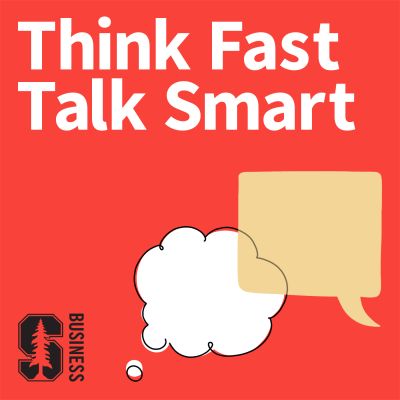Join Matt Abrahams, a lecturer of Strategic Communication at Stanford Graduate School of Business, as he sits down with experts in the field to discuss real-world challenges. How do I send my message clearly when put on the spot? How do I write emails to get my point across? How can I easily convey complex information? How do I manage my reputation? Whether you’re giving a toast or presenting in a meeting, communication is critical to success in business and in life.Think Fast, Talk Smart provides the tools, techniques, and best practices to help you communicate more effectively.
https://www.gsb.stanford.edu/insights/think-fast-talk-smart-podcast
episode 133: 133. From Good to Super: How Supercommunicators Unlock the Language of Connection
The ways supercommunicators operate and how to emulate their techniques.
Across more than 130 episodes, Think Fast, Talk Smart has touched a lot on what it takes to be a good communicator. But what about reaching that next level? What about being a “supercommunicator”? Supercommunicator is a term used by Pulitzer Prize winning journalist and author Charles Duhigg in his latest book, Supercommunicators: How to Unlock the Secret Language of Connection.
In this podcast episode, Abrahams and Duhigg explore the precise techniques that distinguish a good communicator from a “supercommunicator:” traits such as active listening; looping for understanding to demonstrate genuine engagement; and identifying what someone is truly feeling, underneath what they actually say.
Episode Reference Links:
- Charles Duhigg: Website
- Charles Duhigg: Books
- Duhigg’s New Yorker article
- Thalia Wheatley’s research study: The Repurposed Social Brain
- Nicholas Epley’s research paper: Overly Shallow?: Miscalibrated Expectations Create a Barrier to Deeper Conversation
- Alison Wood Brooks’ research paper: The Conversational Circumplex: Identifying, Prioritizing, and Pursuing Informational and Relational Motives in Conversation
- Michael Yeomans’ research paper: It Helps to Ask: The Cumulative Benefits of Asking Follow-Up Questions
- Sheila Heen’s research project: Harvard Negotiation Project
- Ep.92 - No Regrets: How to Take Risks: YouTube / Website
- Ep.82 - It’s Not About You: Why Effective Communicators Put Others First: YouTube / Website
- Ep.103 - Simple is a Superpower: How to Communicate Any Idea to an Audience: YouTube / Website
Connect:
- Email Questions & Feedback >>> thinkfast@stanford.edu
- Episode Transcripts >>> Think Fast Talk Smart Website
- Newsletter Signup + English Language Learning >>> FasterSmarter.io
- Think Fast Talk Smart >>> LinkedIn Page, Instagram, YouTube
- Matt Abrahams >>> LinkedIn
- Stanford GSB >>> LinkedIn & Twitter
Chapters:
(00:00:00) Introduction
Host Matt Abrahams introduces guest Charles Duhigg and his new book Super Communicators.
(00:01:26) Transition from Habits to Communication
Duhigg shares how personal experiences and a desire to understand human interactions motivated him to explore communication.
(00:02:51) The Neuroscience of Connection
The neuroscience behind successful communication and the role of neural entrainment in establishing connection and understanding.
(00:04:21) Storytelling as a Powerful Communication Tool
The importance of storytelling in communication and how stories foster empathy and engagement.
(00:06:16) Identifying and Aligning Conversation Types
Three types of conversations (practical, emotional, social) and the necessity of aligning conversation types for effective communication.
(00:08:07) Practices of Super Communicators
Insights into the habits of super communicators, including their approach to recognizing conversation types and the importance of deep listening.
(00:15:02) Navigating Conflict Through Effective Communication
Managing conflictual conversations with a focus on listening, understanding, and managing control dynamics.
(00:20:50) Challenges of Online Communication
Challenges and strategies for communicating in online and virtual settings.
(00:25:04) The Craft and Impact of Storytelling
Approaches to storytelling and its significance in making complex ideas memorable and engaging.
(00:29:06) Developing New Communication Habits
New communication habits developed from Duhigg's research and their impact on personal and professional interactions.
(00:31:02) The Final Three Questions
Charles Duhigg discusses the importance of deep questions, the communicator he most admires, and his recipe for successful communication.
See Privacy Policy at https://art19.com/privacy and California Privacy Notice at https://art19.com/privacy#do-not-sell-my-info.
